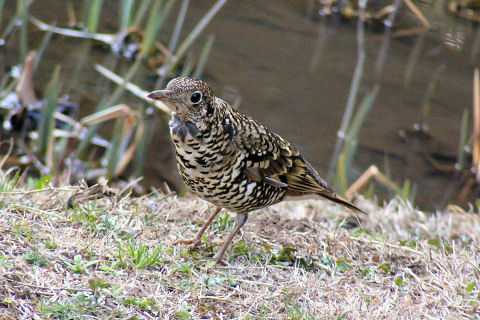|
| Query: Scaly thrush | Result: 6th of 27 | |
White's Thrush (Zoothera dauma) - Wiki
| Subject: | White's Thrush (Zoothera dauma) - Wiki
| |

| Resolution: 480x320
File Size: 69099 Bytes
Date: 2005:03:08 14:23:47
Camera: DiMAGE Z1 (Minolta Co., Ltd.)
F number: f/3.5
Exposure: 10/2000 sec
Focal Length: 580/10
Upload Date: 2007:12:10 10:57:18
|
White's Thrush
From Wikipedia, the free encyclopedia
Order: Passeriformes
Family: Turdidae
[Photo] トラツグミ (Zoothera dauma aurea); White's Thrush. Date: 2005.03.08. Location: Higashitakane Shinrin-koen (forest park), Shiboku-honcho Miyamae Kawasaki Kanagawa Japan. Author ISAKA Yoji (http://commons.wikimedia.org/wiki/User:Cory). Source: http://www.cory.to/kn/kn050308
The White's Thrush or Scaly Thrush (Zoothera dauma) is a member of the Thrush family Turdidae.
It breeds in wet coniferous taiga, mainly in eastern Asia and Siberia. Northern races are strongly migratory, with most birds moving to southeastern Asia during the winter. It is a very rare vagrant to western Europe. It is very secretive, preferring dense cover.
There are four races: Zoothera dauma aurea is the migratory Siberian form, Zoothera dauma dauma breeds in the Himalaya and migrates to the foothills in winter. Zoothera dauma neilgherriensis is resident in the hills of southwest India and Zoothera dauma imbicata is endemic to the hills of Sri Lanka. The latter is increasingly considered a distinct species, while the Amami Thrush and Horsfield's Thrush tend to be included in Zoothera aura, as Zoothera dauma major and Zoothera dauma horsfieldi, respectively.
The non-migratory forms are sometimes considered as separate species. The Sri Lankan race is particularly distinctive, being smaller, long-billed and rufous below, and is sometimes split as Scaly Thrush.
White's Thrushes nest in trees, laying three or four dull green eggs in a neat cup nest. They are one of the largest thrushes at 27cm, and are omnivorous, eating a wide range of insects, earthworms and berries.
The sexes are similar, 27-31 cm long, with black scaling on a paler white or yellowish background. The most striking identification feature in flight is the black band on the white underwings, a feature shared with Siberian Thrush.
The male has a song which is a loud, far-carrying mechanical whistle, with 5-10 second pauses between each one second long phrase twee...tuuu....tuuu....tuuu.
This bird was named after the English naturalist Gilbert White.
http://en.wikipedia.org/wiki/White's_Thrush
| The text in this page is based on the copyrighted Wikipedia article shown in above URL. It is used under the GNU Free Documentation License. You may redistribute it, verbatim or modified, providing that you comply with the terms of the GFDL. |
|
^o^
Animal Pictures Archive for smart phones
^o^
|
|

